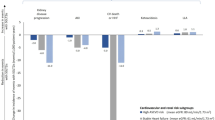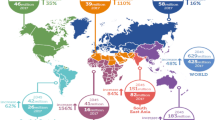Abstract
Background
Type 2 diabetes mellitus (T2DM) is a chronic metabolic disease that is associated with elevated blood glucose levels. Sulfonylureas (SFUs) are the most widely used among the oral antidiabetic drugs that are highly metabolized by cytochrome P450 family 2 subfamily C member 9 (CYP2C9). The CYP2C9 has been shown to be associated with a better glycemic response to SFUs and a lower treatment failure rate. The aim of the present study was to assess the influence of the CYP2C9 rs1067910 gene variant on the SFUs response in a group of Iranian patients for the first time.
Methods
Blood samples were taken from 30 patients with T2DM under sulfonylurea treatment. DNA extraction was performed using Salting out method, and then genotyping was performed by polymerase chain reaction (PCR) followed by Sanger sequencing.
Results
There was no significant difference in the fasting blood sugar (FBS) between T2DM patients with different genotypes before and after the treatment with SFUs (P = 0.073 and P = 0.893, respectively). Although HbA1c was significantly different among AA, CA and CC carriers before (P = 0.001) and after (P = 0.018) treatment, no significant change was observed after treatment in all three groups.
Conclusions
In the present study based on only 30 samples in pilot survey, it is shown that the therapeutic response to SFUs was not related to rs1057910 CYP2C9 variant.




Similar content being viewed by others
Data availability
This project’s data will be open to the public.
Abbreviations
- T2DM:
-
Type 2 diabetes mellitus
- SNP:
-
Single nucleotide polymorphisms
- SFUs:
-
Sulfonylureas
- HbA1c:
-
Hemoglobin A1C
- CYP2C9:
-
Cytochrome P450 family 2 subfamily C member 9
- ADA:
-
American Diabetes Association
- PCR:
-
Polymerase chain reaction
- FBS:
-
Fasting blood sugar
- BMI:
-
Body mass index
References
Stančáková A, Laakso M. Genetics of type 2 diabetes. Novelties in Diabetes. 2016;31:203–20.
Saeedi P, Petersohn I, Salpea P, Malanda B, Karuranga S, Unwin N, et al. Global and regional diabetes prevalence estimates for 2019 and projections for 2030 and 2045: Results from the International Diabetes Federation Diabetes Atlas, 9(th) edition. Diabetes Res Clin Pract. 2019;157:107843.
Ogurtsova K, da Rocha FJ, Huang Y, Linnenkamp U, Guariguata L, Cho NH, et al. IDF Diabetes Atlas: Global estimates for the prevalence of diabetes for 2015 and 2040. Diabetes Res Clin Pract. 2017;128:40–50.
World Health Organization (WHO). Diabetes. https://www.who.int/health-topics/diabetes#tab=tab_1
Association AD. Diagnosis and classification of diabetes mellitus. Diabetes Care. 2013;36(Suppl 1):S67.
Mannino GC, Andreozzi F, Sesti G. Pharmacogenetics of type 2 diabetes mellitus, the route toward tailored medicine. Diabetes Metab Res Rev. 2019;35(3):e3109.
Belle DJ, Singh H. Genetic factors in drug metabolism. Am Fam Physician. 2008;77(11):1553–60.
Dujic T. Pharmacogenetics of new classes of antidiabetic drugs. Bosn J Basic Med Sci. 2021.
Lee HH, Ho RH. Interindividual and interethnic variability in drug disposition: polymorphisms in organic anion transporting polypeptide 1B1 (OATP1B1; SLCO1B1). Br J Clin Pharmacol. 2017;83(6):1176–84.
Loganadan N, Huri H, Vethakkan S, Hussein Z. Genetic markers predicting sulphonylurea treatment outcomes in type 2 diabetes patients: current evidence and challenges for clinical implementation. Pharmacogenomics J. 2016;16(3):209–19.
Zhang H, Liu X, Kuang H, Yi R, Xing H. Association of sulfonylurea receptor 1 genotype with therapeutic response to gliclazide in type 2 diabetes. Diabetes Res Clin Pract. 2007;77(1):58–61.
Udler MS, Kim J, von Grotthuss M, Bonàs-Guarch S, Cole JB, Chiou J, et al. Type 2 diabetes genetic loci informed by multi-trait associations point to disease mechanisms and subtypes: a soft clustering analysis. PLoS Med. 2018;15(9):e1002654.
Ferder N, Eby CS, Deych E, Harris JK, Ridker PM, Milligan P, et al. Ability of VKORC1 and CYP2C9 to predict therapeutic warfarin dose during the initial weeks of therapy. J Thromb Haemost. 2010;8(1):95–100.
Rettie AE, Jones JP. Clinical and toxicological relevance of CYP2C9: drug-drug interactions and pharmacogenetics. Annu Rev Pharmacol Toxicol. 2005;45:477–94.
Dujic T, Zhou K, Donnelly LA, Leese G, Palmer CN, Pearson ER. Interaction between variants in the CYP2C9 and POR genes and the risk of sulfonylurea-induced hypoglycaemia: A GoDARTS S tudy. Diabetes Obes Metab. 2018;20(1):211–4.
Holstein A, Plaschke A, Ptak M, Egberts EH, El-Din J, Brockmöller J, et al. Association between CYP2C9 slow metabolizer genotypes and severe hypoglycaemia on medication with sulphonylurea hypoglycaemic agents. Br J Clin Pharmacol. 2005;60(1):103–6.
American Diabetes Association (ADA). 2. Classification and diagnosis of diabetes: standards of medical care in diabetes—2019. Diabetes Care. 2019;42(Supplement 1):S13-S28.
Swen JJ, Wessels JA, Krabben A, Assendelft WJ, Guchelaar HJ. Effect of CYP2C9 polymorphisms on prescribed dose and time-to-stable dose of sulfonylureas in primary care patients with Type 2 diabetes mellitus. Pharmacogenomics. 2010;11(11):1517–23.
Gökalp O, Gunes A, Çam H, Cure E, AydIn O, Tamer MN, et al. Mild hypoglycaemic attacks induced by sulphonylureas related to CYP2C9, CYP2C19 and CYP2C8 polymorphisms in routine clinical setting. European Eur J Clin Pharmacol. 2011;67(12):1223–9.
Castelán-Martínez O, Hoyo-Vadillo C, Bazán-Soto T, Cruz M, Tesoro-Cruz E, Valladares-Salgado A. CYP2C9* 3 gene variant contributes independently to glycaemic control in patients with type 2 diabetes treated with glibenclamide. J Clin Pharm Ther. 2018;43(6):768–74.
Naja K, Salami A, El Shamieh S, Fakhoury R. rs622342 in SLC22A1, CYP2C9* 2 and CYP2C9* 3 and Glycemic Response in Individuals with Type 2 Diabetes Mellitus Receiving Metformin/Sulfonylurea Combination Therapy: 6-Month Follow-Up Study. J Pers Med. 2020;10(2):53.
Zeng W, Guo Y, Chen P, Liu Z, Chen D, Han C. CYP2C93 variant is associated with antidiabetes efficacy of gliclazide in Chinese type 2 diabetes patients. J Diabetes Investig. 2016;7(5):764–8.
Yee J, Heo Y, Kim H, Yoon HY, Song G, Gwak HS. Association Between the CYP2C9 Genotype and Hypoglycemia Among Patients With Type 2 Diabetes Receiving Sulfonylurea Treatment: A Meta-analysis. Clin Ther. 2021; S0149–2918(21)00120-X .
Klen J, Dolzan V, Janez A. CYP2C9, KCNJ11 and ABCC8 polymorphisms and the response to sulphonylurea treatment in type 2 diabetes patients. Eur J Clin Pharmacol. 2014;70(4):421–8.
Chen L, Li J, Kaur V, Muhammad A, Fernandez M, Hudson M, et al. The presence of two reduced function variants in CYP2C9 influences the acute response to glipizide. Diabetic Med. 2020;37(12):2124–30.
Acknowledgements
The authors would like to give special thanks to the T2DM patients participating in this study.
Author information
Authors and Affiliations
Contributions
MH managed the project and provided guidance to the research; ED and NS drafted the manuscript and performed lab genotyping; MA performed the statistical analysis; HRAM: provided clinical guidance to the research. All authors contributed to and approved the final version of the manuscript.
Corresponding author
Ethics declarations
Consent for publication
All patients signed written consent forms and the study was approved by the ethical committee (Ethic Code: IR.IAU.PS.REC.1399.044).
Competing of interest
The authors have no conflict of interest to report.
Additional information
Publisher's note
Springer Nature remains neutral with regard to jurisdictional claims in published maps and institutional affiliations.
Rights and permissions
About this article
Cite this article
Didari, E., Sarhangi, N., Afshari, M. et al. A pharmacogenetic pilot study of CYP2C9 common genetic variant and sulfonylureas therapeutic response in type 2 diabetes mellitus patients. J Diabetes Metab Disord 20, 1513–1519 (2021). https://doi.org/10.1007/s40200-021-00894-0
Received:
Accepted:
Published:
Issue Date:
DOI: https://doi.org/10.1007/s40200-021-00894-0




